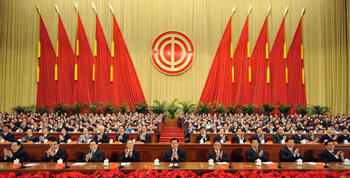 Derek Liu will look at what drives the provision of social welfare in China. He argues that the central authorities are able to use promotion as a mechanism to shape policy at the local level despite decentralization. Ambitious provincial officials—those who seek to advance their careers to the top levels—comply with central government mandates and increase social spending in order to impress Beijing and increase their chances for promotion. Officials who are more interested in provincial or municipal careers, however, prefer to spend money on economic projects tied to their business partners. Liu’s presentation draws on novel data sources, including expenditures on “dining and entertaining,” as well as more than one hundred interviews with officials. Liu’s work is based on fourteen months in the field. Click here to watch a video of the presentation
Derek Liu will look at what drives the provision of social welfare in China. He argues that the central authorities are able to use promotion as a mechanism to shape policy at the local level despite decentralization. Ambitious provincial officials—those who seek to advance their careers to the top levels—comply with central government mandates and increase social spending in order to impress Beijing and increase their chances for promotion. Officials who are more interested in provincial or municipal careers, however, prefer to spend money on economic projects tied to their business partners. Liu’s presentation draws on novel data sources, including expenditures on “dining and entertaining,” as well as more than one hundred interviews with officials. Liu’s work is based on fourteen months in the field. Click here to watch a video of the presentation

Christina Chen will examine how China’s government has responded to workers’ demands for higher wages and better working conditions. Increased tensions have caused the government to empower the previously feeble official trade union to become more active promoter of workers’ interests. At the local level, the empowered labor unions act as fire-alarms by inducing labor bureaucracies to increase their enforcement efforts with respect to labor laws and regulation. This is one method by which the authoritarian government seeks to maintain power. Chen’s work is informed by provincial-level data from the 1990s to today as well as interviews with officials in a number of locations. Click here to watch a video of the presentation.
Click here to RSVP.

